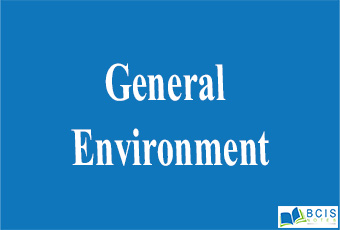
General Environment
General environment refers to broad external conditions that may affect the business activities of an organization. It is also known as macro environment. It is uncontrollable. General environment involves political, economic, socio-cultural and technological components.
A. Political environment- The political/legal force refers to the government regulation and legal system for business. It influences three institutions- legislature, executive and judiciary. The following are the common components of the political-legal environment:-
- Constitution- Constitution is the fundamental law acceptable to all people of the nation. It is an important formal document of a democratic system of government. It defines the framework within which the business has to perform the activities.
- Political philosophy- Political philosophy is an ideology that a state has adopted. Broadly, there are three types of philosophy, they are democratic, socialism, and mixed.
- Political parties- Political parties are an indispensable component of a democratic system. In a democratic country, there are many political parties.
- Political institution- Political institution consist of legislative, executive and judiciary.
- Legal institution- These institutions are different levels of courts consisting of District Courts, Appeal Courts and Supreme Courts.
B. Economic environment- Economic force refer to all factors, which give shape and form to economic activities. These factors consist of interest rates, inflation, change in disposable income, stock market fluctuation and stage of the general business cycle. The following are the components of the economic environment:-
- Economic system- Economic system represents the foundation of the economic environment of a country.
- Economic policies- Economic policies are the guidelines adopted by the government for the economic prosperity of the nation.
- Economic conditions- Economic conditions focus on the economic strengths and weaknesses of the nation in which organizations perform their business.
- Capital market- The development of the capital market shows the shape of the economic environment of the nation.
- Globalization- Globalization is the integration of the world into a huge market.
C. Socio-cultural environment- Socio-cultural environment includes the total social forces within which an organization operates. It involves tradition, social values, believes, norms, attitudes, custom, and demographic composition. The following are the common elements of the socio-cultural environment:-
- Demography- Demography focuses on the composition of the population of the country.
- Lifestyle- Lifestyle is the pattern and living standard of the people.
- Social values- Social values are the beliefs and norms of society.
- Social institution- Social institution involve basic components of society like a family, reference groups and social class.
- Religion- Religion is the belief and trust that groups people have accepted since long ago.
- Language- Language is the medium of expressing views, ideas, knowledge, experience etc.
D. Technological environment- Technology refers to the systematic application of knowledge to convert inputs into outputs. It provides the resources with which people work and also affects the tasks that they perform. The following are the components of the technological environment.
- Nature of technology- Technology may be manual or automatic. Manual technology is a labour based whereas automatic is capital based.
- The pace of technological change- Technology is dynamic and ever-changing.
- Technology transfer- Technology can be transferred through a joint venture with multinational companies, direct technical assistance, project support, training and publication.
- Research and development budget- It is the function of managers to understand the needs and demands of the customers on the basis of time.
Therefore the components of the general environment are explained above.
You may also like Emerging Business Environment in Nepal

Leave a Reply